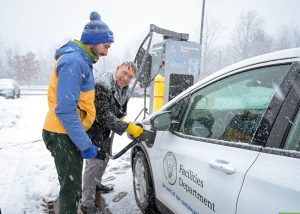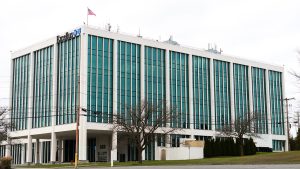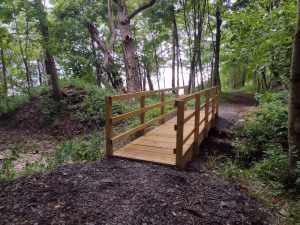ROME — The nine companies involved in this year’s HUSTLE Defense Accelerator at the Innovare Advancement Center at Griffiss Institute in Rome are preparing for their Demo Day, which is set for Aug. 17. HUSTLE stands for Helping Upstate Science and Technology Leaders and Entrepreneurs. Griffiss Institute broke this year’s program into two tracks. The […]
Get Instant Access to This Article
Become a Central New York Business Journal subscriber and get immediate access to all of our subscriber-only content and much more.
- Critical Central New York business news and analysis updated daily.
- Immediate access to all subscriber-only content on our website.
- Get a year's worth of the Print Edition of The Central New York Business Journal.
- Special Feature Publications such as the Book of Lists and Revitalize Greater Binghamton, Mohawk Valley, and Syracuse Magazines
Click here to purchase a paywall bypass link for this article.
ROME — The nine companies involved in this year’s HUSTLE Defense Accelerator at the Innovare Advancement Center at Griffiss Institute in Rome are preparing for their Demo Day, which is set for Aug. 17.
HUSTLE stands for Helping Upstate Science and Technology Leaders and Entrepreneurs.
Griffiss Institute broke this year’s program into two tracks. The accelerate track is a 12-week program that is for early stage teams, and the elevate track is an eight-week program for more advanced teams.
“We had a broad mix of companies — those that were very early in their development and some that maybe had a couple of years under their belt, but were looking to explore the [U.S.] Department of Defense as a customer and a partner,” Heather Hage, president and CEO of the Griffiss Institute in Rome, tells CNYBJ in a June 28 interview.
The HUSTLE Defense Accelerator is described as an “elite and immersive” accelerator for seed-stage tech startups pushing artificial intelligence / machine learning (AI/ML), cyber, quantum and UAS solutions with dual-use potential and the drive to elevate the United States’ national security and economic competitiveness, per the Griffiss Institute’s website.
Many of the participating teams are from upstate New York. They include a few university spinouts and some firms, such as EMPEQ, that have been participating in the region’s entrepreneurial ecosystem.
“If you look into their lineage, [EMPEQ is] a great example of a company that has stood up in New York and moved around all the various startup resources in our Upstate ecosystem to be successful,” says Hage.
Depending on what track they’re involved in, the HUSTLE teams either started in late May or late June but all the participants are working toward the Demo Day, which is set for Aug. 17.
The teams that started in late May spent their first few weeks focusing on their value proposition, understanding the customer discovery landscape, working with the Griffiss Institute team to get some advisement on how to set priorities during the program. “How to make the most use of their time with us,” says Hage.
In the eight-week program, teams step up their involvement with customers along with the activity in the training and development exercises that help them to grow and make more connections in the Upstate region.
The activity includes guest speakers who talk about both their successes and failures as entrepreneurs and sharing technical expertise such as dealing with a business program or a financial issue, using government grants, and refining their business model.
“So when I say technical expertise, I mean both in the sense of technology connections but also in problem solving real issues for their business and our team connecting them externally with the custom resources that they need to be successful,” says Hage.
On Demo Day, the participating companies will be competing for investments from funding that was raised for the HUSTLE program totaling at least $300,000, according to Hage.
The dollar amounts of the investments are up to the judges taking part in the Demo Day event.
“It gets allocated however the judges determine,” Hage notes.
She also tells CNYBJ that the general public is welcome to attend the Demo Day event.
Participating Companies
The companies involved in in the 12-week accelerate track include:
- Accessible Automation of Rome, which developed a wireless temperature-control system;
- Drone City LLC, which describes itself as a “people-friendly drone-delivery services;”
- Kquika, which says it “discovered a way to assist airline enterprises in resolving flight delay issues and ultimately becoming customer-centric through predictive maintenance software,” per its website.
Those involved the 8-week elevate track include:
- Paterson Aerospace Systems Corporation, which describes itself as a “think tank of professional engineers and scientists with a passion for protecting environmental assets for safer and cleaner space exploration;”
- BosonQ Psi, which says it has a vision “to be the premier Simulation software company utilizing Quantum Computing to serve enterprise customers;”
- LLUME (organic robotics corporation) started at Cornell University and is working with Light Lace technology. The core team Light Lace is now working on “applying these game changing sensors to different form factors to provide real time feedback on motion, muscle fatigue, and vitals of professional athletes,” per its website;
- EMPEQ (Empower Equity, Inc.), which says its “Fast Site Survey combines One-Click Capture of detailed, accurate data on building equipment and customizable forms and templates to make site surveys up to 80% more efficient,” per its website;
- Cyberspara, which is “developing a transformational and unique game-based learning platform, called Digital-PASS to empower individuals to mitigate security threats from the Internet;” and,
- Imagine Aerial (iaflight.com) is a UAS (drone) and Ai Data company that deploys advanced sensors on UAS to quickly and safely assess critical infrastructure, per the description provided by Griffiss Institute. Acquired data is processed through proprietary Ai/ML and delivered direct to client workflows to inform and prioritize their critical infrastructure strategies. The company has IP technologies under patent and trademark pursuit and has performed in 26 states, within the restricted airspace of 13 military bases and dozens of major airports to deliver proven technology that substantially reduces critical assessment time while improving safety.




